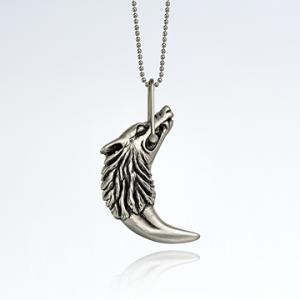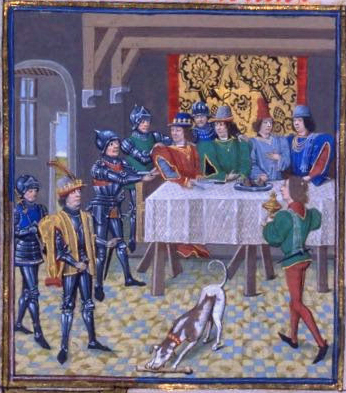For this post, the fourth and final one on my favorite history book, A Distant Mirror: The Calamitious 14th Century by Barbara Tuchman, I wish I had a deep-voiced television announcer to say, “Previously on Wendy Brandes Jewelry …” and give a summary of the three preceding posts. Since I don’t have that guy, I’ll borrow this “Previously on Lost” video. WHAT?!
Previously on Wendy Brandes Jewelry:
As I said in Part III, Tuchman uses the life of Enguerrand de Coucy VII, a French nobleman born in 1340, to provide narrative structure. Coucy knew, worked for and fought against numerous kings. Yet he’s also someone to whom readers can relate.A Sure, he had a giant donjon and direct access to kings, queens and popes, so he certainly wasn’t “just like us,” as US Weekly would say, but he was more like us than the royalty was. We’ve seen it before: royalty, like Lord Byron, was mad, bad and/or dangerous to know. As for royal marriages, they were about politics, not love. Tuchman explains:
“Marriages were the fabric of international as well as inter-noble relations, the primary source of territory, sovereignty, and alliance, and the major business of medieval diplomacy. The relations of countries and rulers depended not at all on common borders or natural interest but on dynastic connections and fantastic cousinships which could make a prince of Hungary heir to the throne of Naples and an English prince claimant to Castile.”
Or, to put it more simply, marriage was about huuuge tracts of land.
In a fantasy world, a royal marriage would create strong ties and peace between two nations. In the real world, it “created as many conflicting claims and hostilities as it did bonds.” Such a claim is how one of the many kings in Coucy’s life, Edward III of England, decided that he was king of France too.A You know a little about Edward because my Isabella wolf-fang necklaces and earrings are named after his mama, a French princess who married Edward’s father, the previous king of England.
When that maternal ancestry inspired Edward to declare himself the rightful heir to the throne of France, the ruling French king, Philip VI, not surprisingly, disagreed. In 1337 the two countries began what became known as the Hundred Years’ War, during which English, French and foreign mercenary armies intermittently marched up and down the French countryside, generally to no lasting effect, all the while stealing food, raping women, and burning down towns as it suited them. The populations of both English and France paid burdensome taxes to support the armies.A “The cost of war was the poison running through the 14th century,” Tuchman writes.
Such chaos and carnage created opportunities for Coucy — a statesman/warrior of rare courage, integrity, military and diplomatic skill, common sense and coping ability. One example of Coucy’s ability to make lemonade from lemons was his marriage to Edward’s eldest daughter, whom he met while being held as a hostage in England. The hostage episode seems bizarre to me. It occurred after France’s King Jean II, who inherited the throne and the war when his father Philip VI died in 1350, was captured in battle in 1356. After nearly 20 years of death and destruction over the question of who ruled France, it would have made sense if Edward chopped off Jean’s head and snatched his throne.A But, because sense often didn’t enter into 14th century politics, the two sides instead took four years to negotiate a peace treaty under which the French agreed to turn over various territories and pay a hefty ransom for their king. During that time, Jean enjoyed a free-spending royal lifestyle in England; he must have been disappointed when he was sent home to raise his own ransom. When Jean left, he sent Edward 40 noble and royal French hostages, including Coucy, as a guarantee of the ransom.A But Jean decided that living as a well-treated, cheese-eating surrender monkey in England was more fun than squeezing more taxes out of the unhappy, war-ravaged French. He voluntarily returned to England in 1364 . The fact that he died in a matter of months didn’t mean the English were willing to waive the ransom. Business is business, and at least one Frenchman was still a hostage after 12 years. Coucy, however, was outta there in 1365 thanks to his new wife, Isabella, Edward’s spoiled second child (same name as her jewelry-inspiring French grandma).

There are no portraits of Coucy, but here I am finding my niche at the remains of Coucy's castle in France last summer.
After the marriage, Coucy spent a dozen very diplomatic years based in France, managing his dual allegiances to both Charles V, Jean II’s successor, and to his father-in-law Edward in England, even as international tensions continued.A It was only in 1377, when Edward died and his 10-year-old grandson ascended to the English throne as Richard II, that Coucy formally renounced his English ties. Free-spending Isabella followed her inheritance back to England, where she died two years later. There’s no way of knowing if Coucy missed his wife. He definitely didn’t miss out on anything with Richard, an unpleasant character and bad ruler who, in Tuchman’s words “developed all the instincts of absolutism except the toughness to quell his opponents …”
Still, Richard was a charmer compared to the King of Navarre, Charles II, aka Charles the Bad, who was a thorn in everyone’s side for decades. A grandson of French king Louis X (1289-1316), Charles, like Edward in England, felt entitled to certain territories in France. He pursued them through murders, starting in 1354 with Jean II’s close friend; and betrayals, repeatedly switching sides during the Hundred Years’ War. Tuchman finds the Lord Byron comparison as irresistible as I do, describing Charles as “volatile, intelligent, charming, violent, cunning as a fox, ambitious as Lucifer and more truly than Byron ‘mad, bad and dangerous to know.'” Early on, Coucy seems to have supported him, but in the end it was Coucy who, with his colleague Bureau de la Riviere, led the French army that finally pushed Charles out of the disputed territory of Normandy in 1378. In one vividly worded passage typical of the turn of phrase that so endeared this book to me, Tuchman writes:
“Scotched at last after thirty years of compulsive plotting, Charles of Navarre was left to live out a destitute and friendless decade in his mountain kingdom so much too narrow for his soul. So might Satan have been penned in a sheepfold.”
Just in case you’re in one of those moods where you think bad people never get what’s coming to them, I’m delighted to let you know that Charles the Bad died in agony in 1387, two weeks after his valet accidentally set him on fire. Just in case that makes you feel sorry for Charles, keep in mind that this came after his attempted poisoning of the French Dukes of Burgundy and Berry.
Charles the Bad wasn’t the last crazy King Charles in Coucy’s life, and Richard II wasn’t the last boy-king. When Charles V died in 1380, his 11-year-old son became Charles VI of France. This Charles didn’t start ruling on his own until 1388. Until then, the country was run by the boy’s uncle, Philip, Duke of Burgundy — the one from Navarre’s hit list. Charles VI was originally known as Charles the Beloved, but after the onset of mental illness, including psychotic periods during which he was convinced he was made of glass, he was called Charles the Mad. Charles the Mad and Charles the Bad! I am bummed that there was no Charles the Dangerous to Know for a Byronic nickname hat-trick.
Anyway, Uncle Burgundy was happy to run France during Charles’s glassy periods and it was he who got excited about a crusade. Crusades were like sports in those days — an outlet for testosterone that might otherwise lead to trouble in the neighborhood. Burgundy found a good cause in Hungary, whose Christian king, Sigismund, was looking for allies to help him fend off Turks led by Sultan Bajazet. Tuchman writes, “The Sultan had boasted that after chasing Sigismund out of Hungary he would continue on to Italy, where he would plant his banners on the hills of Rome and feed his horse oats on the altar of St. Peter’s.” Them thar’s fightin’ words!
Burgundy put his 24-year-old son, Jean de Nevers, nominally in charge of the French troops.
The commander-in-chief of the army was Constable D’Eu, a youngish cousin of the king. Burgundy apparently had some concerns about leadership because he asked Coucy,A then “the most experienced warrior … in the realm,” to serve as Nevers’s chief adviser.A The French happily packed up “silks and velvet and gold embroidery” as well as “wines and festive provisions,” and left the catapults and other siege weapons at home.A If you think that sounds like a recipe for disaster, you’re right. On September 25, 1396, D’Eu — or, as Tuchman calls him, the “brainless Constable, a third choice for that office” — overrode the advice of King Sigismund and Coucy and demanded the crusaders go on the offensive against the Turks at Nicopolis. He hoped to achieve personal glory, the chivalric ideal, but instead saw his comrades massacred. Bajazet kept a few nobles around for ransom, including Coucy, D’Eu and Nevers, as well as some younger soldiers to be used for slave labor, and marched them 350 miles to Gallipoli. This was not the kind of pleasant hostage situation Coucy had enjoyed in England. Depressed and exhausted, he died far from home, in February 1397, at age 56.
His life had been action-packed:
“Since he had first marched at fifteen against the English, and at eighteen hunted down the Jacquerie, the range of Coucy’s experience had extended over an extraordinary variety of combat, diplomacy, government, and social and political relationships. As son-in-law of Edward III, holding double allegiance to two kings at war, his position had been unique. He had seen war as captain or one of the top command in eleven campaigns — in Piedmont, Lombardy, Switzerland, Normandy, Languedoc, Tuscany, northern France, Flanders, Guelders, Tunisia, Genoa; he had commanded mercenaries, and fought as ally or antagonist of the Count of Savoy, Gregory XI, Hawkwood, the Visconti, the Hapsburgs, the Swiss, Navarrese, Gascons, English, Berbers, the Republic of Florence, and the nobles of Genoa. As diplomat he had negotiated with Pope Clement VII, the Duke of Brittany, the Count of Flanders, the Queen of Aragon, with the English at peace parleys, and the rebels of Paris. He had had one tempermental and extravagant wife eight years his senior, and a second approximately thirty years his junior. He had served as adviser and agent of the two royal Dukes, Anjou and Orleans, as Lieutenant-General of Picardy and later of Guienne, as member of the Royal Council, as Grand Bouteiller of France, and had twice been the preferred choice for Constable. he had known and dealt with every kind of character from the ultra-wicked Charles of Navarre to the ultra-saintly Pierre de Luxemburg.”
The Europe he left behind was one diminished by the Black Death, in spiritual crisis, at war both at home and away. Believe it or not, the next fifty years got worse. But then, Tuchman writes, “… at some imperceptible moment, by some mysterious chemistry, energies were refreshed, ideas broke out of the mold of the Middle Ages into new realms, and humanity found itself redirected.” And that’s one of the great pleasures of reading history, my friends: finding hope where you least expect it.



A book I shall add to my Amazon.com wish list. I love reading a good history book. I went througha “Vikings” stage and before that “de Medicis” now I am interested in the Medieval times again.
Is it weird that I closed my eyes and imagined Morgan Freeman announcing that first part?
Could you imagine living in times when you could get your head chopped off? What? WHAT? WHAT?
Great photo of you as usual — you look 16 (in a good way).
Yes, it’s agreed that Jean de Nevers was not attaractive. The hat doesn’t help, it only elongates his features even more. He needed a stylist, dammit!
Hi there-Your Isabella wolf-fang range is my personal favourite, I so adore the earrings, BADLY!! Love your outfit clog post, the Miu Miu clogs just look so lovely!!!
I will read this book, preferably with an empty house and a week to myself to languish and indulge!
The best review ever of one of my favorite books. You’ve reminded me that I really must make a pilgrimage to the remains of Coucy’s castle. Merci beaucoup !
I will not read this book. But I might tell people that I have since you have given me the tools to lie. THANK YOU.
Erin, that’s why people read the New York Times book review too!
What Erin said. I find history so fascinating, but I can’t maintain that interest for the length of a whole book. Your four part series are probably my limit 😉
Did you study history at university? You talk about it so fluently! x
Nice Fang!
I will also not read this book and make no bones about it.
Beatrice D.
This book sounds like it packed a lot of history into its pages. No wonder you needed to spread it out over four posts and so many months. 🙂
Also, I had to LOL at “a well-treated, cheese-eating surrender monkey.” I think I’ll make that my new aspiration in life.
PS
There is definitely a GREAT, HEAVY, HISTORIC NOVEL in you waiting to get out!
Go 4 it!
I just won’t B reading it.
Pls 4give
She only reads blogs now
so beautiful wolf Wendy!!! you also look fantastic with that denim and jacket!
kisses for you 🙂
wow i just had a history lesson!
and btw you look amazing.. and i love the previously on lost guy.. haha
Now I don’t need to finish my copy of this book!
LOL.
I’ll finish it. But I don’t really *need* to, now that you’ve done this great synopsis!
Not sure if I can work myself through the book, but I gather that European aristocracy is a great inspiration for jewellery.
That book sounds intense – I want to read it! Wonderful post!
i am in love with that wolf-fang necklace. my wendy b shopping list is getting very long.
xxx
t
i don’t think i am a person, as i cannot get the anti-spam word right. i really can’t figure it out.
Wendy, I really enjoy reading your book reviews and I appreciate the time that it takes for you to write them. Please keep them coming.
Love the wolf ring! So pretty and detailed. I also like your jeans they look very stylish on you.
That book sounds intense lol I need to pick up my reading habits again
tl;dr; I just want to say your whole outfit is incredibly cute and your blazer is setting off all kinds of receptors in my brain–I LOVE it!!!!
Plus I saw your Cleopatra earrings on Samantha in either Rolling Stone, Entertainment Weekley, or Star Magazine (ahem)–I don’t remember which, but I was reading all those yesterday. xx
Heh–sorry 🙂 I went back and found it. It was EW on page 47. I’m so happy for you!
Cool blazer, WendyB!
♥
Okay, after that read, I’m going to have to seek this book out. I hadn’t heard of it prior but it’s now on my list. Thank you 🙂
And I adore the pictures to accompany (the outfit shot is fab too 🙂
Great review of a book I have read, but not since…I was pregnant. Every other mom-to=be was reading “What to Expect when you’re Expecting” and I was reading A Distant Mirror.
And I wonder why my son is a bit eccentric?